Practicing Harp Happiness
#221: Mistakes as Milestones: A New Mindset for Growth
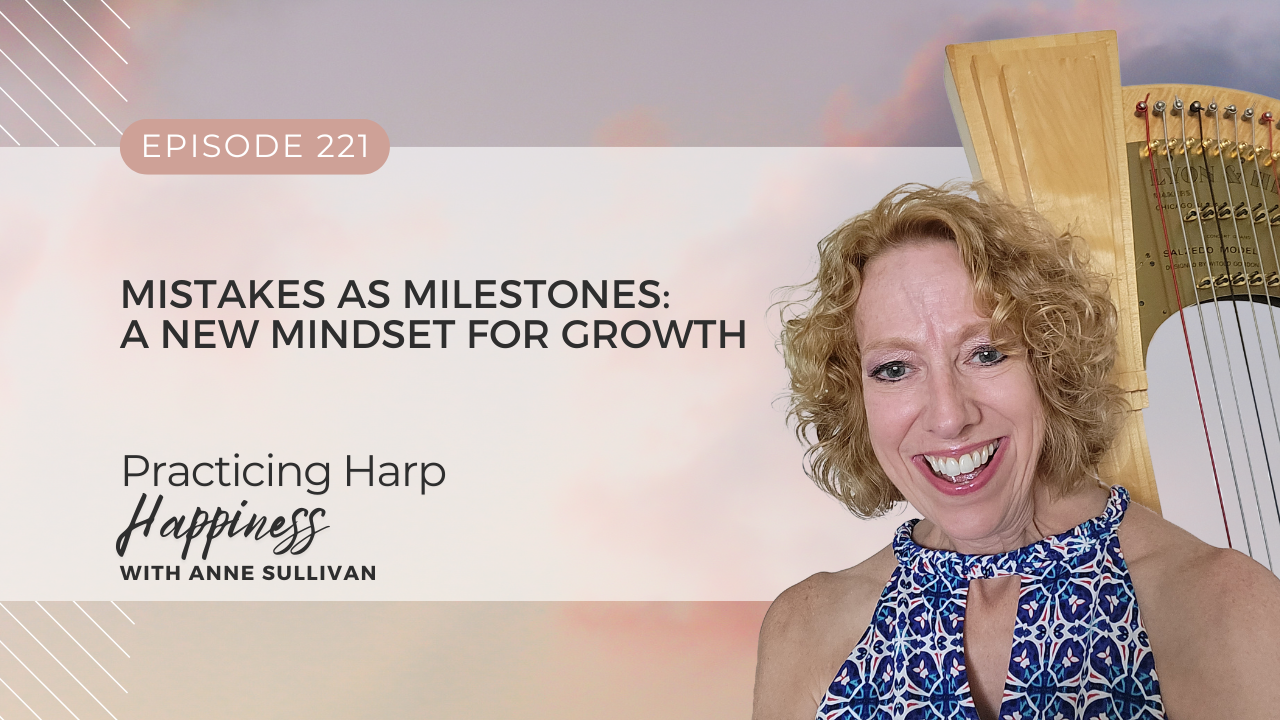
Not all mistakes are created equal. Sure, some need to be addressed and fixed. But others? They’re signs of progress. They tell you that your ears are sharper, your awareness is expanding, and your technique is evolving.
Let’s put it in context. We live in a world that’s constantly trying to correct us. Type an email, and autocorrect will instantly jump in. Google will underline a word in red, and we assume it's wrong—just because it looks unfamiliar. But autocorrect doesn’t always get it right. And neither does your inner critic. Just because something feels like a mistake doesn’t automatically mean it is.
In harp practice, this same principle applies. That little stumble in a piece might not be a sign of backsliding. It could mean you're playing at a higher level and noticing subtleties you didn’t even hear before.
Consider this: I was deadheading flowers in the garden the other day. At first, I only saw a few to snip. But as I trimmed those, more and more faded blooms seemed t...
#219: Back to the Harp - Without Killing the Vacation Vibe

I know I’m dating myself, but here goes…
Back in the 1960’s there was a television show called “Sea Hunt.” The show centered around a free-lance scuba diver named Mike Nelson, played by Lloyd Bridges. Mike Nelson was a former Navy diver and a member of the Coast Guard Auxiliary. As a free-lance diver, he was hired for all kinds of dangerous underwater work, everything from salvaging precious cargo from wrecked ships to rescuing people trapped in caves. Each episode had dangerous situations and villains who were ready to slash the hoses on Mike’s air tanks.
In nearly every episode, Mike would have to make a hasty ascent from the depths, which he would attempt to time carefully to avoid “the bends,” a potentially fatal condition more formally called decompression sickness. On occasion. Mike would have to spend time in a decompression chamber.
Watching this as a child, I was fascinated by the danger of too hasty a return to the surface. On the one hand, Mike would be running out ...
#215: The Superpower of Shortcuts and Why You Need Them Now
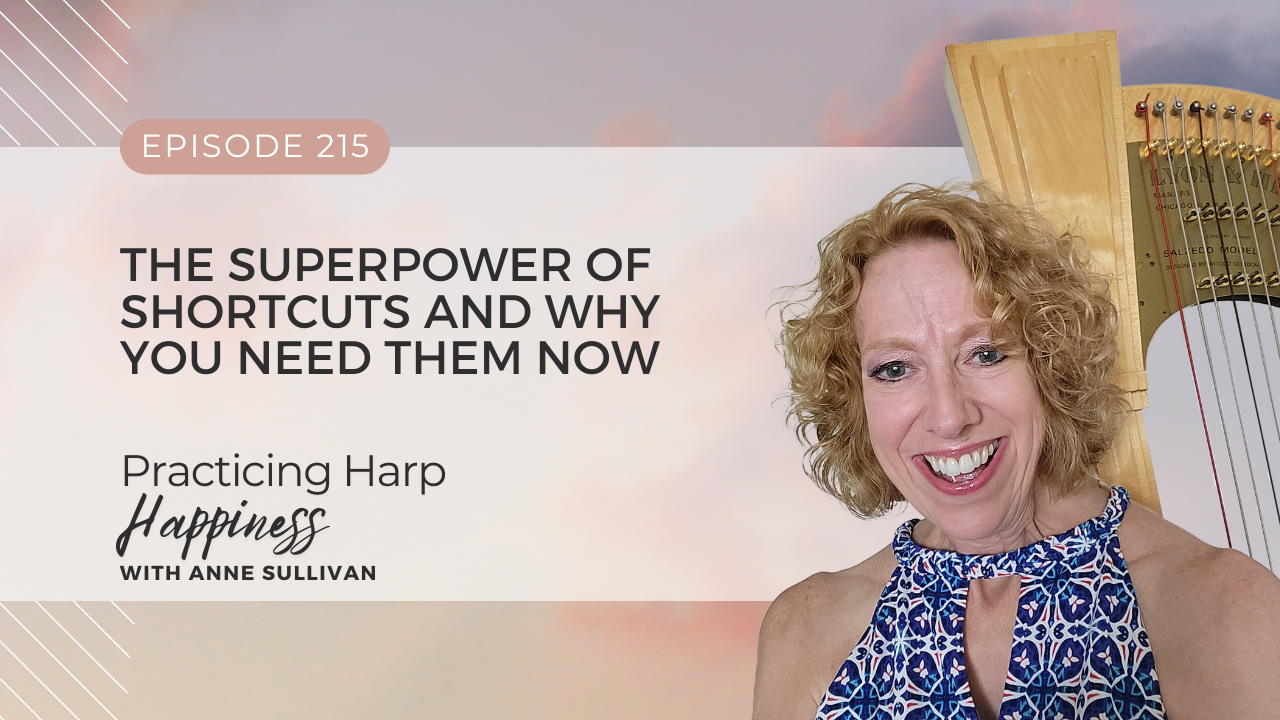
There’s a third kind of shortcut, though, that I want us to think about today. It’s the kind of shortcut that comes with experience. I remember when I was learning to sew and following all the directions very carefully so that I wouldn’t mess up. I even learned which pattern companies had the clearest directions, and which seemed to presume that I knew more than I did, so there were steps missing. Those missing steps weren’t shortcuts, per se; they were just knowledge that a more experienced sewer would have.
One day, I watched a professional seamstress start to cut out a dress. She was making a concert dress for me, and I was excited to watch her start on it while I could watch. What turned out to be an even bigger thrill was to see that instead of painstakingly pinning the pattern onto the cloth, the way I learned in Home Ec class, she just laid a few weights on the pattern to hold it lightly in place and cut around it. What a shortcut and a timesaver! And why had I never though...
#214: Recovering from Burnout - the 5R Framework to Recover and Reset
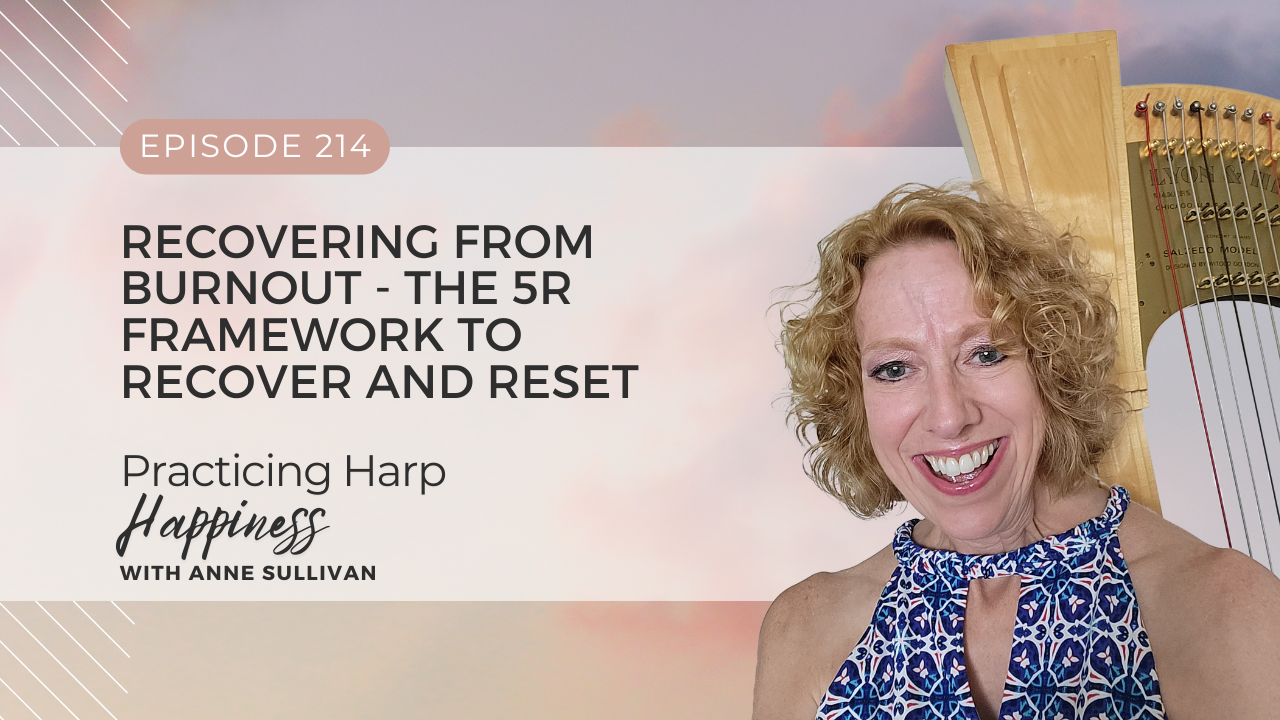
It’s summer time here and time for a little R and R, rest and relaxation, maybe even time away. You might be feeling like you need some time away from whatever stress you’ve been experiencing. I hope it isn’t your harp playing that’s been causing the stress, but even playing and practicing the harp can cause frustration and burnout. If you’re feeling like you need a break from your harp playing, I’m here to help and to make sure you take that break in a way that will bring you more confidence and more joy in your harp playing again.
Actually, at the time you are listening to this, I am on vacation with my husband. We are in Bermuda, which is one of our favorite places to vacation. We went there for our honeymoon and loved it so much that we planned to go back every five years. We’ve missed a couple of those five year milestones; COVID was one of the reasons, of course. But this year, we’re going back and I can’t wait.
Often people will ask me if I take a harp when I’m on vacation,...
#211: Could Your Practice Today Actually Be More Fun?
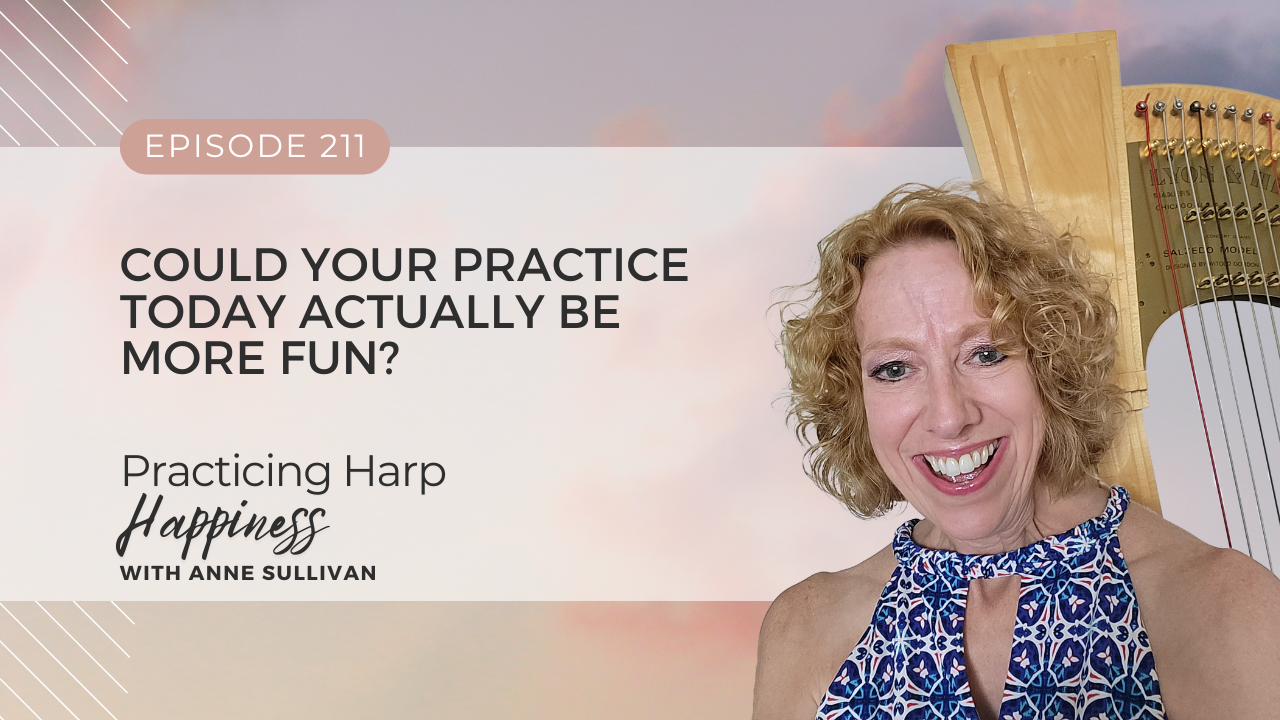
Every time I talk about putting more fun into your practice, I hear feedback like, “I enjoy my practice,” or “I really like doing the challenging work,” or “My favorite part of practice is my exercises and etudes.” All of those harpists are enjoying their practice, and that’s terrific. But that’s not what I mean.
Much of what we do in our practice can accidentally disconnect us from the music we want to make. We identify and correct mistakes. We drill our technique. We repeat passages over and over again. That’s all part of practice, and it is part of what enables us to play well. But there’s so much more that we could be doing in our practice, so much more that is truly aligned with why we are playing the harp.
Here’s an example that may help you understand what I mean. A young person wants to be a doctor because she likes helping people. She goes to medical school where part of her training involves working when she’s physically exhausted. Part of her training also helps her lea...
#209: Is Your Practice Not Working? Maybe Hard Work Isn’t the Answer
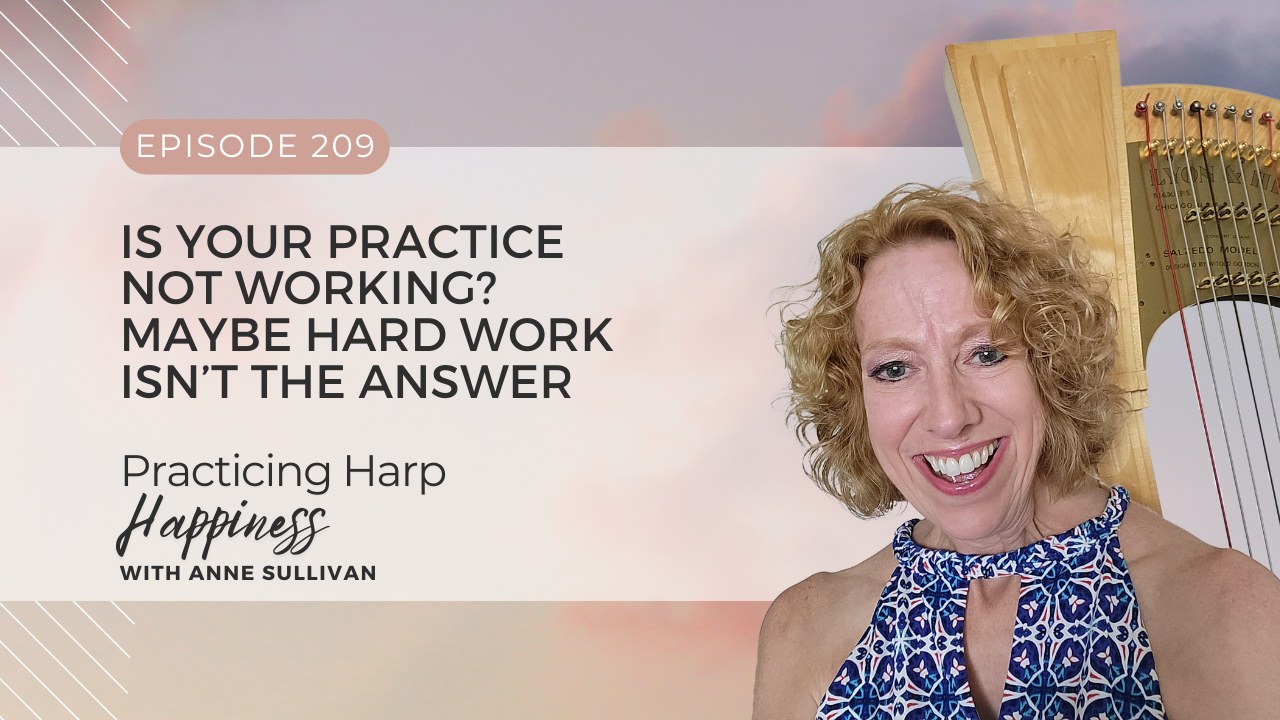
Today I want to talk with you about hard work. I don’t mean how to buckle down and do the hard work. We all know that playing the harp is hard, and we spend a lot of time working out practice techniques, strategies and routines to help us play the music we want in spite of the difficulties.
No, what I want to talk about today is how to get out of the “just buckle down and do it” mindset. The truth is that when it comes to playing the harp or even music in general, sometimes trying harder is counter-productive. For instance, the harder we try to get that harmonic to ring, the more it just thuds. The harder we try to play faster, the more our fingers become tense and so they don’t have the flexibility and agility required for speed. The more we drill those recalcitrant two measures, the more they refuse to flow.
But if hard work isn’t the answer, what is?
Let me be clear. Hard work, or at least work, is necessary. But the way we approach a difficulty in our harp playing shouldn’t ...
#204: Review Done Right: It’s More Than Repertoire
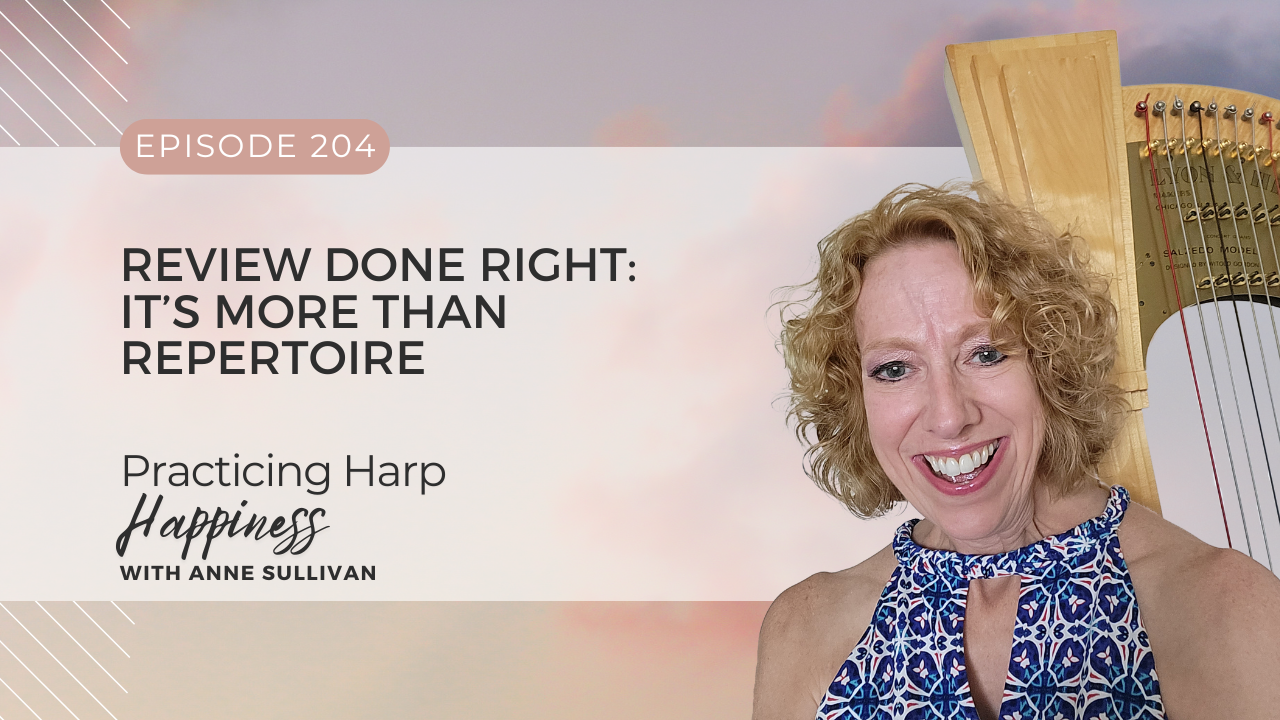
Do you review your pieces? If you don’t review your pieces regularly, then keep listening because today we are going to explore the different reasons you might want to start and a few different methods for review you might want to try.
But here’s the thing; if I asked a dozen harpists who say they review their pieces how they do their review, I will get a dozen different answers. Some people schedule it; others set a rotation. Some people do both. Some harpists are trying to develop a repertoire list of music they can play at a moment’s notice. Others are trying to keep the last piece they learned in their fingers. (By the way, we’ll talk today about what that phrase, “in your fingers,” means. )
I last talked about review on this podcast in episode 99. That episode is called “The Shortcut Way To Build And Maintain A Repertoire.” In that episode I outline some step-by-step frameworks to grow your repertoire with simple review tactics. I have linked directly to that episode in the ...
#203: Why Slow Practice Works - and When It Doesn't
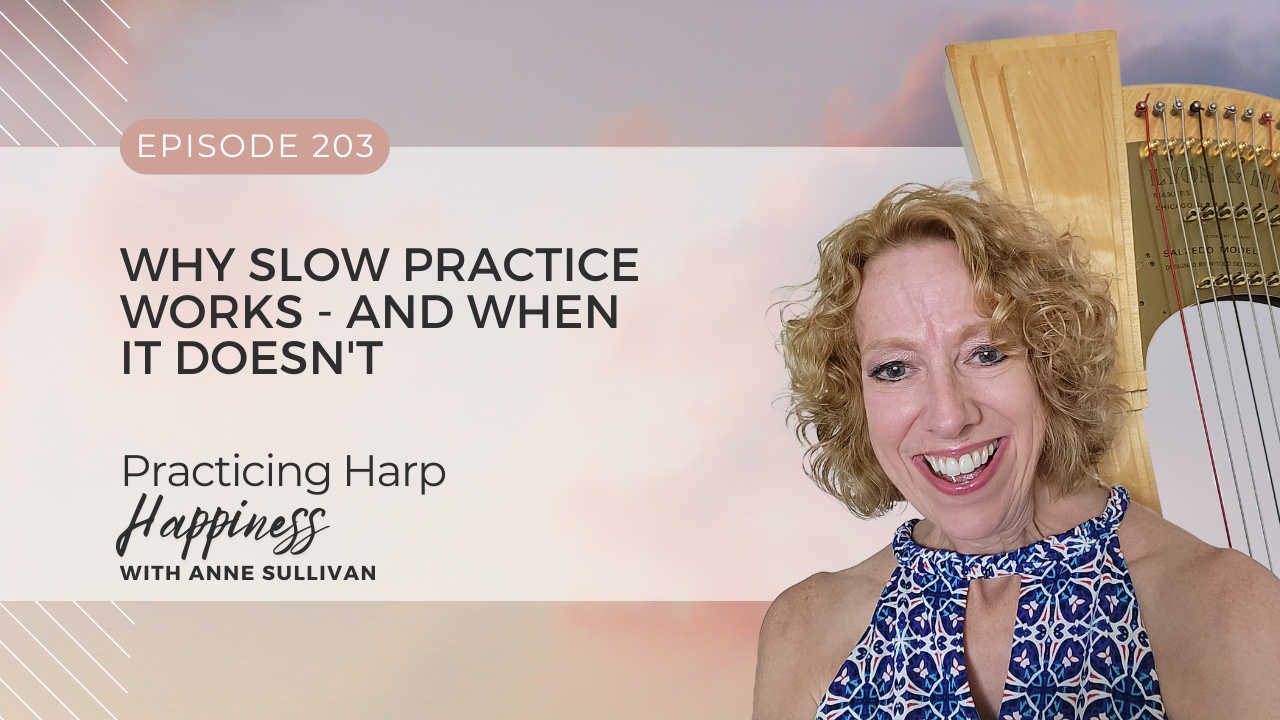
My harp background is in the Salzedo method. This is the technique method devised and taught by legendary harpist Carlos Salzedo. It was at the time, the early part of the twentieth century, a startlingly different concept of harp playing and harp technique and the aim was to bring the harp into the modern world. The aesthetic of the method varied in almost every way possible from the French tradition in which Salzedo was trained.
But we aren’t discussing physical technique today. We are discussing practice technique, one practice technique in particular: slow practice. Please understand that slow practice has always been a part of harp studies and for very good reasons, which we will discuss shortly. Salzedo, however, was known for teaching his students to practice slowly and loudly.
I need to quickly add a couple of disclaimers. First, the loud and slow practice attributed to the Salzedo method is a broad statement, and as such, is not completely accurate. Second, and more impo...
#201: Are You Practicing Enough?
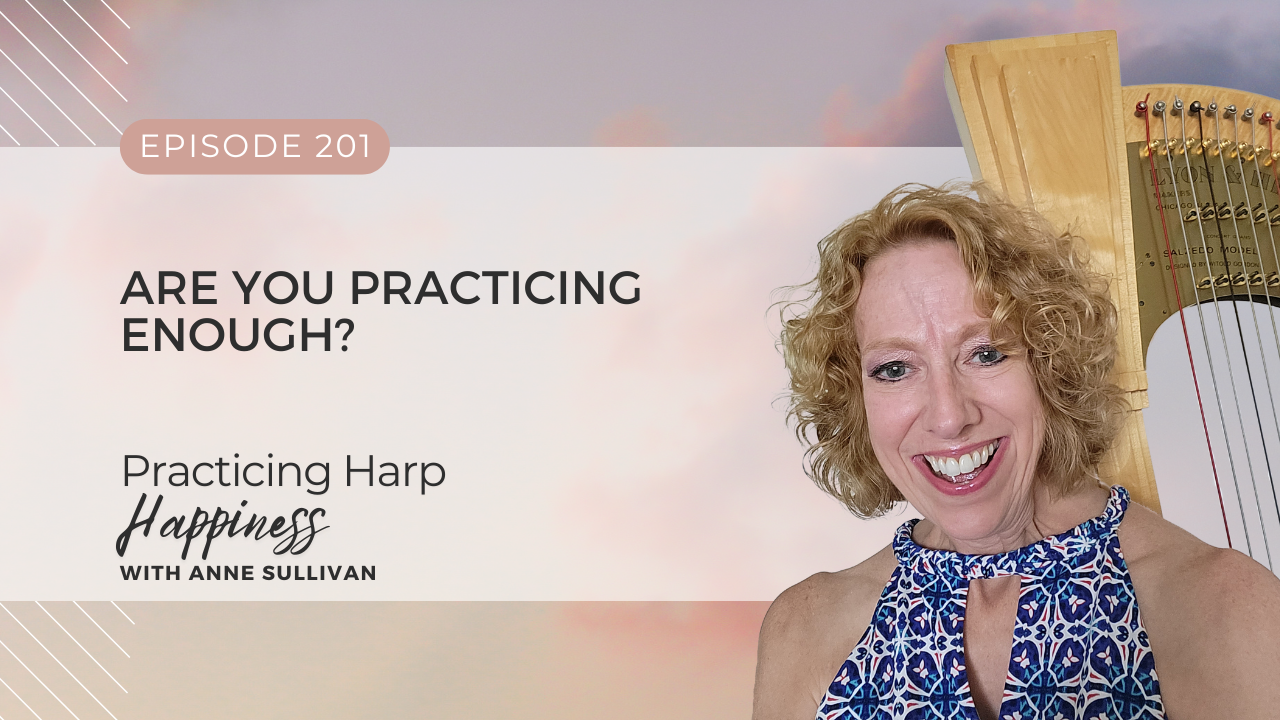
Here’s a question we’ve probably all wondered about at some point: am I practicing enough?
As a teacher, I can tell you that my experience has demonstrated that if a harpist - and this includes me - has to ask the question, the answer is probably no, you’re not practicing enough. But of course, the real answer is likely a little more complicated. It depends on what you’re trying to do.
On the light end of the practice spectrum, if you’re just trying to keep the rust off either your fingers or your pieces, you probably only need a few minutes each day. On the other end, if your ambition is to learn a piece or stretch your technique or develop a skill, you are going to need more time. I know it would be helpful to know exactly how much time you’re going to need, but coming up with a number would just be guessing.
Even so, that doesn’t mean there aren’t some factors that can guide you that will keep you from overworking yourself or underutilizing your time. Simply put, your goal i...
#200: Small Steps to Break Through and Grow
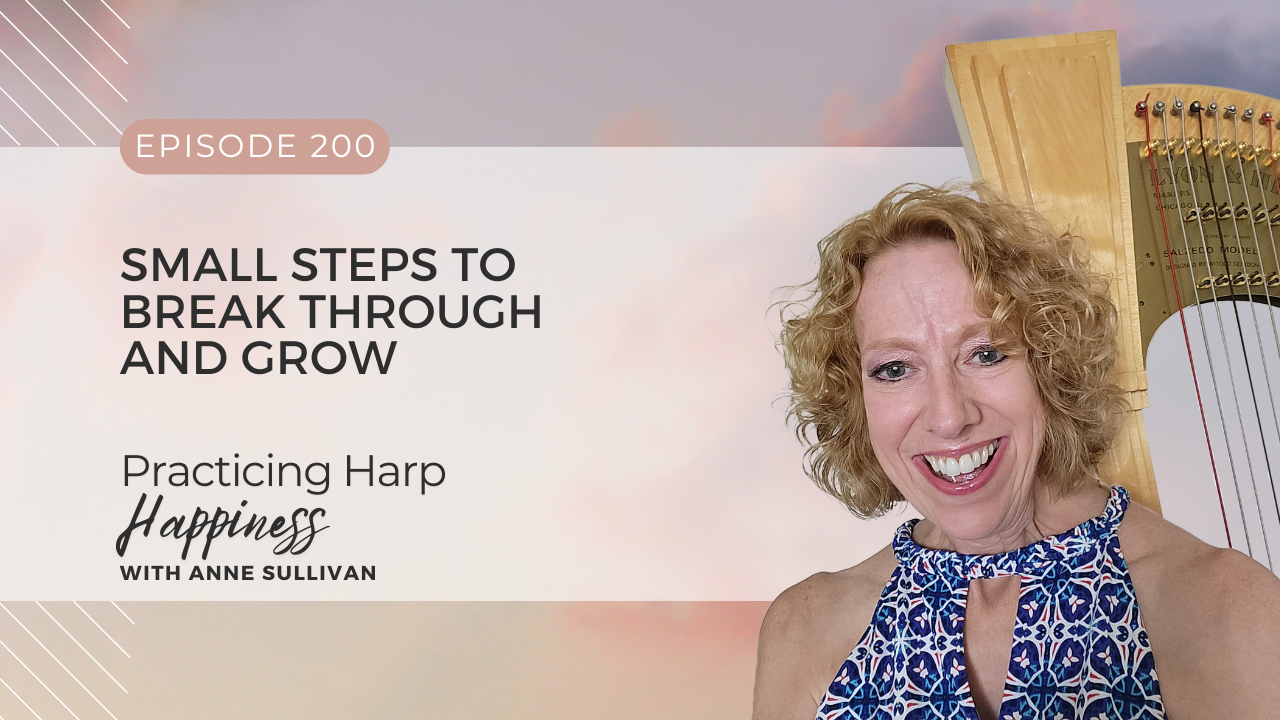
How do you measure something that is unmeasurable? How do you quantify something that can’t be contained or counted? How do you assess something that is completely subjective? You might think you can’t, but yet, that’s what we attempt to do every day in our practice.
We try to gauge our progress. We try to determine exactly when a piece is “finished.” Exact measurements aren’t possible in music. We can’t time our progress. “This piece will take exactly 37 days to learn to the degree of polish that I personally want.” If only we could have that degree of certainty, the whole practice thing would be so much easier.
I realize I am guilty of perpetuating this unreality. I often use notional percentages to represent stages of “finish” for a piece. For instance, I’ll call a piece 80% done if I can play most of the notes correctly most of the time at a tempo that’s at least 80% of my goal tempo. It’s hardly scientific, but it gives me and my students a way to judge where we are on our jo...

